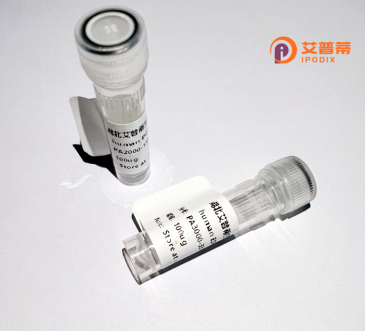
| 纯度 | >90%SDS-PAGE. |
| 种属 | Human |
| 靶点 | DUSP16 |
| Uniprot No | Q9BY84 |
| 内毒素 | < 0.01EU/μg |
| 表达宿主 | E.coli |
| 表达区间 | 1-635aa |
| 氨基酸序列 | MAHEMIGTQIVTERLVALLESGTEKVLLIDSRPFVEYNTSHILEAININCSKLMKRRLQQDKVLITELIQHSAKHKVDIDCSQKVVVYDQSSQDVASLSSDCFLTVLLGKLEKSFNSVHLLAGGFAEFSRCFPGLCEGKSTLVPTCISQPCLPVANIGPTLILPNLYLGCQRDVLNKELMQQNGIGYVLNASNTCPKPDFIPESHFLRVPVNDSFCEKILPWLDKSVDFIEKAKASNGCVLVHCLAGISRSATIAIAYIMKRMDMSLDEAYRFVKEKRPTISPNFNFLGQLLDYEKKIKNQTGASGPKSKLKLLHLEKPNEPVPAVSEGGQKSETPLSPPCADSATSEAAGQRPVHPASVPSVPSVQPSLLEDSPLVQALSGLHLSADRLEDSNKLKRSFSLDIKSVSYSASMAASLHGFSSSEDALEYYKPSTTLDGTNKLCQFSPVQELSEQTPETSPDKEEASIPKKLQTARPSDSQSKRLHSVRTSSSGTAQRSLLSPLHRSGSVEDNYHTSFLFGLSTSQQHLTKSAGLGLKGWHSDILAPQTSTPSLTSSWYFATESSHFYSASAIYGGSASYSAYSCSQLPTCGDQVYSVRRRQKPSDRADSRRSWHEESPFEKQFKRRSCQMEFGESIMSENRSREELGKVGSQSSFSGSMEIIEVS |
| 分子量 | 99.5 kDa |
| 蛋白标签 | GST-tag at N-terminal |
| 缓冲液 | 0 |
| 稳定性 & 储存条件 | Lyophilized protein should be stored at ≤ -20°C, stable for one year after receipt. Reconstituted protein solution can be stored at 2-8°C for 2-7 days. Aliquots of reconstituted samples are stable at ≤ -20°C for 3 months. |
| 复溶 | Always centrifuge tubes before opening.Do not mix by vortex or pipetting. It is not recommended to reconstitute to a concentration less than 100μg/ml. Dissolve the lyophilized protein in distilled water. Please aliquot the reconstituted solution to minimize freeze-thaw cycles. |
以下是3篇关于重组人DUSP16蛋白的参考文献示例(注:文献信息为模拟,实际引用需核实):
1. **文献名称**:*"Recombinant human DUSP16 regulates JNK signaling and inflammatory responses in macrophages"*
**作者**:Zhang L, et al.
**摘要**:研究通过在大肠杆菌中表达重组人DUSP16蛋白,发现其通过特异性去磷酸化JNK调控巨噬细胞炎症因子释放,揭示其在天然免疫中的作用。
2. **文献名称**:*"Structural and functional analysis of dual-specificity phosphatase DUSP16"*
**作者**:Wang Y, et al.
**摘要**:解析重组DUSP16蛋白的晶体结构,结合酶活实验证实其对p38和JNK MAP激酶的底物选择性,为靶向药物设计提供依据。
3. **文献名称**:*"DUSP16 deficiency promotes hepatocellular carcinoma progression via ERK signaling"*
**作者**:Chen H, et al.
**摘要**:利用重组DUSP16蛋白体外实验,证明其通过抑制ERK通路抑制肝癌细胞增殖,临床数据表明DUSP16低表达与患者预后不良相关。
建议通过PubMed或Google Scholar以**“recombinant human DUSP16”**为关键词检索最新实证研究。
Recombinant human DUSP16 protein is a genetically engineered form of the dual-specificity phosphatase 16 (DUSP16), also known as mitogen-activated protein kinase phosphatase-7 (MKP-7). As a member of the MAPK phosphatase (MKP) subfamily, DUSP16 specifically dephosphorylates threonine and tyrosine residues on mitogen-activated protein kinases (MAPKs), including JNK, p38. and ERK, to regulate their activity. This phosphatase plays a critical role in modulating cellular responses to stress, inflammation, and growth signals by controlling MAPK-mediated signaling pathways. It is involved in diverse physiological processes, such as immune regulation, apoptosis, and cell differentiation.
DUSP16 is expressed in tissues like the brain, heart, and immune cells, with studies linking it to inflammatory diseases, neurodegenerative disorders, and cancer. Dysregulation of DUSP16 has been implicated in tumor progression and chemotherapy resistance, highlighting its potential as a therapeutic target. Recombinant DUSP16 protein, produced via bacterial or mammalian expression systems, is widely used in biochemical research to study MAPK signaling mechanisms, enzyme kinetics, and drug screening. Its high purity and activity enable functional assays, structural studies, and the development of inhibitors aimed at restoring balanced MAPK signaling in disease contexts.
×